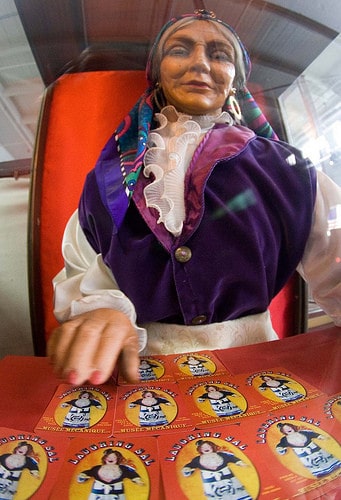You’ve spent months preparing for a vacation to your dream destination with plans set in stone weeks prior to departure – only to hear reports about political instability, cyclones, or any number of potential travel pitfalls. Between optimistic hearsay and government travel warnings it can be difficult to know just when to pull the plug on a trip or continue on to your destination.

Reading past all of the general advice from family, the media, and travel companies it’s easy to get apprehensive and lost in a fog of information; so, just when should you cancel your travel plans?
 Keep The Genie In The Bottle
Keep The Genie In The Bottle
Fortune telling is hardly a science, yet the further you are from your actual travel date, the more any travel prediction or warning becomes just that. Planning types may have some trouble with this, but you’re better off assessing a situation very close to your travel date than before.
Also, canceling a trip because you (or the media) are speculating on, say, political instability, too far in advance could mean you’re missing out on the benefits of canceled flights and tours.
- Flight Cancellations – It takes quite a bit for the airlines to call off flights; don’t make changes without official word on their situational policy. (Here’s how to fight back if your flight is canceled.)
- Trip Insurance Before It’s Too Late – Travel insurance companies won’t cover your losses for “known events” so if you’re concerned about canceled flights or losses due to them, consult with the company in advance. They’ll have specific information with cutoff dates and what you can claim based on a given situation. (Should you get travel insurance?)
Of course, travel pitfalls come in all shapes and sizes. Weather events like “snowpocalypses” are less predictable and while they can disrupt your plans, recovery from even bad natural disasters is usually quick. Modification, not cancellation, of your plans might be in order.
When There’s Targeted Violence
Government travel warnings tend to blanket entire countries without being all that detailed. The important distinctions to make are: where specifically there might be ongoing conflict, the threat of localized violence (e.g. due to unrest), and targeted violence.

- Where? – Decipher travel warnings and find out specifically where (and if) there’s active conflict and the scope of it. Chances are you’re not going to be anywhere near them and you can cancel if you are. Fighting heating up in the southern Philippine islands, for example, doesn’t warrant canceling a trip to Manila – or most of the country for that matter. (Northern Iraq is another great example.)
- Localized Violence – Political demonstrations and protests are generally common around the world but expressions of democracy that can be tense. Generally speaking though, these events are highly localized (like the Red Shirt Protests during Bangkok’s state of emergency); avoid them and you’re probably in no more danger than if they didn’t exist.
Targeted violence towards foreigners, tourists, journalists (or those perceived to be) in a city or part of the world you had plans to visit is a strong indicator to cancel.
The other forms of violence can be usually avoidable and have nothing to do with you specifically. Violence targeting foreigners or hostile attitudes towards your home country (ethnic background or creed) is a completely different situation; and not particularly conducive to sightseeing.
 Sure You Can Go, But What Can You See?
Sure You Can Go, But What Can You See?
Finding flights to Egypt at the moment still isn’t impossible, but good luck getting much further than Cairo International Airport or a hotel room. Flights continuing to a destination don’t mean much if when you arrive you’ll be stuck staring at four walls. Unless you’re looking to specifically see what’s disrupting, you know, “normal life”, than save yourself the trip and go when you can actually see the place you’re going to.
Missing That Site On Your Bucket List
I’m not a big fan of the term “bucket list” (please tell me if there are plans you can make after you die) but if your travel plans are based on seeing very distinct set of sites, then it might be worth calling off a trip if they’re completely inaccessible. We all travel for a variety of reasons and no matter what yours are, if those are significantly disrupted, consider canceling for another time.

Get Your Case In Order – It Ain’t Easy
Sometimes your plans are canceled for you, thanks to the travel companies you’ve booked with. From a logistical point of view that’s an ideal scenario, because canceling trip plans that include flights, accommodations, or others you’ve booked in advanced is rarely smooth sailing. If you do decide to cancel, use The Art Of War to win battles across any ticket counter and state your case clearly.
Finally, keep in mind that for ever situation that does get out of control (e.g. as is the case in Egypt), there are many, many more where all of the warnings you hear don’t amount to much for most travelers. You know yourself best so research well and assess how close (or far) you’ll be from harm’s way.
[photos by: Neil B (pyramids at Giza), Willy Volk (fortune teller), larry&flo (targets Madrid Atocha station), Kanaka Menehune (woman blindfolded), longhorndave (empty blue bucket)]












I called off my trip to Egypt yesterday, going to head to Morocco for now instead. I know I’ll be heading to Turkey for April so maybe we’ll still run across each other.
Yesterday is when I mentally did it too, although some flight cancellations are bumping that along too at the moment. Funny, just when things were settling down and I thought, well, I can continue on…the situation flipped very quickly. Have fun in Morocco and hope to see you elsewhere.
I suggest you both head to Jordan…I loved it there!
Hi Anil,
Good point about travel warnings since they often tend to be blanket statements. Take Mexico’s drug war for example. Only some parts in north of the country are affected while the rest is as normal as it can be. Additionally, foreigners are seldom the victims unless associated with the theme in some way. Despite this, the fear of going to Mexico is abundant, only made worse by accounts of one killing here and one kidnapping there which is read out of context. Honestly, how safe is New York city in comparison? At the Cancun airport, a couple said to me – “Thank god nothing happened to us.” And later they told me that all they did was to spend time in a resort hotel. Now this has just turned into ignorance.
Even lonely planet Mexico had some funny (in my opinion) advise. “Don’t take the bus at night, we have received some reports of theft.” And then the guidebook-thumping folks in my hostel were paranoid. Excuse me? When was the book published? Have you tried to look at current situation?
Anyway, the whole point is that one should use their judgment and read facts on security matters before making ad-hoc decisions of canceling a travel plan to a particular place or the entire trip.
Hi Priyank,
I don’t know if it’s the same in Canada, but I see in the US media there is a huge focus on the violent crime in Mexico – really gives a distorted view. I agree with you – the blanket statements are often way off – I don’t know if that’s just a ‘cover your ass’ policy or simply because nobody really looks at the overall statistics or local situation.
Either way, I’m glad the couple survived their time in Cancun!
Very timely post. We had planned to go to Egypt in March, and it was hard to put that on hold. We’re living in the south of France for a year with our kids, and Egypt was the one place the whole family wanted to travel to while we’re in Europe. Now it’s obvious that was a good decision, but it wasn’t that obvious when we canceled.
The flip side is that sometimes if there is uncertainty you can get great deals or visit places that are usually too crowded to be much fun. Some of our most amazing travel was in the months after 9/11. Most people were sticking close to home (which I get – it was a crazy time) so we got to see some great places without the crowds.
Hi Diane,
I’m curious, when did you decide to cancel and what was the ‘final straw’ as it were? I was to be there in about 10 days and after yesterday’s violence and a slew of canceled flights decided against going.
It’s true though, in general, the recovery period for any place in terms of tourism is a great place to find travel deals 🙂
Hi Anil,
Our “final straw” was the day those first four people were killed, but we have young kids (5 and 7) so we’re pretty conservative now. Pre-kids the final straw would have been the curfew. As you said, no point in traveling all that way to stay inside.
Hi Diane,
Thanks for following up – I’d say both good reasons to modify or cancel a trip 🙂
I’ve had people panicking and calling me about earthquakes and violence because I was in a country where something had happened but it was so remote and isolated. I would definitely do a lot of research before canceling a trip.
I get that too, especially from family 🙂
Hi Anil,
Interesting and timely article, especially as we are making our way home to Turkey through some potentially volatile countries over the next few months.
Writing from Dahab, I wouldn’t know we’re in a country in turmoil. I believe there are around 1600 foreign tourists here, normally it would be around 5-6000 at this time of year, so it is far quieter than normal.
Other than the recent blocking of the internet, the ATMs not working properly, increased political discussion and everyone glued to the TV it seems quiet and normal. The strangest part is the lack of effort the touts and shopkeepers are making to part us from our money (they know we can’t get any).
I have heard we have the local Bedouin to thank for the safety in the town and, were it not for the potential for the situation to change at any moment, I would recommend people keep their travel plans on track.
I had a flight in a few days to Cairo – though now one of my connecting flights has been canceled. Going to have to work around it I think – how long are you in Dahab/Egypt?
Three, four more days probably. We’ve been here a month so I guess it’s time to move on. Luckily we found a working ATM today so we can finally pay our hostel bill and leave when we choose.
Two extra points come to mind:
1. Check several countries travel warnings (lots of countries issue them) to get a better feel of the situation. The US ones particularly tend to be very conservative.
2. Think “modify” travel plans rather than cancel. Many trips can simply be a matter of travelling to a nearby country instead and still having a wonderful break.
Hi Mark,
Thanks for the additional points. Your first one is certainly true, according to the US travel warnings more than half the world is made out to be a pretty perilous place.
Good, practical advice, Anil. I’ve never had to change travel plans due to political unrest. Your tips make it easier to know when to cancel and when to go.
Luckily events that make canceling a possibility are rare, glad you haven’t had to deal with it. The airlines and other travel companies can make it a pain under most circumstances.
I’ve yet to have to cancel a trip, and thankfully so. This article gives some really fantastic advice – especially with regards to people looking beyond the govt warnings or media. I am convinced they are on a campaign to keep people from traveling and spend their money at home instead.
haha, it would be funny to see governments issue domestic advisories based on their own criteria. I wonder what they’d consider off-limits then!
This is good advice, especially with the situation in Egypt as it is currently, and numerous tourists being evaced out. There’s an odd fascination to disaster tourism, but it does carry serious risks with it.
In the large cities most definitely so now, the country is in flux making it extremely difficult to navigate unless you know it well already.
Great post! I try to to get too excited when “terror alerts” come out or governments hype up danger in a region, but sometimes you really should use caution when travelling. I’m also not a fan of the term “bucket list”, haha.
Travel alerts have the potential to be so useful but unfortunately try to cover too much without being specific.
As for ‘bucket list’, I shuddered even writing it but I think we’re in the minority Andrea!
Well – I just had to go through this. It seems like traveling in the Middle East right now is a bit up in the air. 2 weeks ago everything was blowing up in the government in Lebanon and I had a trip to Beirut the next week. It did force me to get up to date on the political situation there very quickly! The state department had no updates – so I relied on local friends and Lebanon news. I decided to go.
All is fine here – yet it’s Beirut…so it always feels like it could crumble at any time. Even while in the country now I have to stay pretty up to date on what’s going on as more governmental decisions are being made and there are anniversary’s of the former prime minister’s assassination on Feb. 14th. So – even though I’m here – I still have to stay on top of it all!
I did end up getting trip cancellation insurance for my flight out just in case I had to leave early due to political turmoil.
However, all in all – I’m thrilled I came – it’s an amazing city with a history that is stunning.
Hi Sherry,
Seems we’re circling the same areas these days! As I’m now reworking my route due to Egypt I’m also keep a close eye on Jordan and Lebanon as well. Though I must say the stalemate in Egypt has held back many more demonstrations and emboldened other regional governments. I don’t think outside of Yemem there will be much more upcoming (Egypt-style) turmoil.
Canceling plans can be a bummer. There is just so much involved with canceling plans these days. The fee, the paperwork and the calls to customer service can all be so overwhelming. I try to keep the embassy apprised of what dates I will be traveling and where I will be. Not only do they “try” to keep track of you, but at least in the US they send you a newsletter of whenever something goes down or is about to go down. I found it pretty useful durring the whole red shirt issue in Thailand.
Interesting to know, I’ve never registered with either of the embassies I could do it with; nice to know they give you more than just the assurance. Canceling is often a pain because so many travel plans are made on the back of a patchwork of companies. It’s really like you’re canceling say, 5 plans at once, rather than one single event 🙂
Agreed too many separate place to coordinate with. Good think Christy is the organized one. I usually just fly by the seat of my pants. :O
I’d say also check and compare several countries’ travel advice, not only your own. Some tend to be …. shall we say, overly cautious.
Definitely a good idea to cross reference 🙂
If I had cancelled trips because of government warnings and security threats I wouldn’t have visited at least 10 countries, and many more areas. Take El Salvador, where violence is still abundant and there is a travel advisory ( I have to admit though that I was robbed while sleeping, and heard gun shots too, but nothing happenned to me), Guatemala City is not particularly safe, or even Mindanao in southern Philippines is not recommended because of terrorist activities- yet I had no problems and enjoyed great surf in Siargao. At the end of the day I think it all comes to: 1) If there’s a flight , and 2) If there’s unrest in the specific place you want to visit. But if other nearby towns or destinations are available and attractive , you will probably be fine.
My general line of thought is that if a warning is serious, you won’t be able to escape it from the media. Also, there’s a big difference between just a warning and a flat out advise against all travel advisory.
How did you get robbed while sleeping, was that in a hostel?
My girlfriend has an upcoming trip to Japan. It’s so difficult to swallow canceling a trip when she has scheduled all her vacation and family time around a particular set of plans. It’s even tougher when there is so much uncertainty regarding their situation. It seems the key for her has been getting excited about developing a great fall back trip.
I can imagine, especially when the plans are made far in advance. Sometimes it’s just not meant to be. What are the fallback plans if you don’t mind me asking?
A few months ago, I wrote a post called “Why I got off the plane – when travel doesn’t go as planned”. It was about sitting on a plane for a couple of hours and arriving a little too late to my destination for my intended purpose. As the doors were about to close, I got off the plane (my own choice) and then questioned whether I made the right decision.
This wasn’t so much about the specifics of canceling travel plans but the psychology behind doing so. Sometimes, you have to do what feels right regardless of the circumstances.
Intuition is a powerful part of travel decisions; and so many of those decisions are reversible if we want to give them another chance.